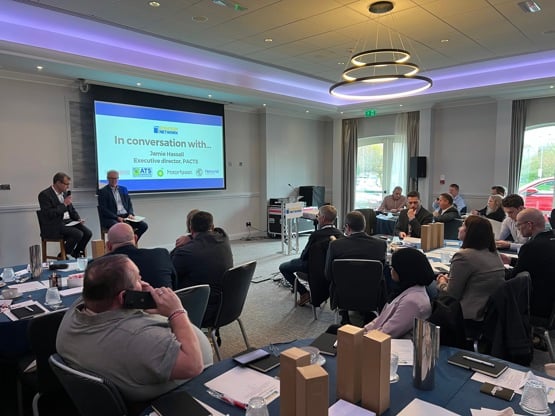Progress in reducing road traffic deaths and serious injuries in the UK has flatlined since 2010, prompting calls for Government to take more action.
Around a third of all fatal collisions involve someone who is driving for work, meaning fleet operators have a part to play in making the roads safer.
The Parliamentary Advisory Council for Transport Safety (PACTS) has coordinated a new manifesto calling for immediate and strategic action to address the persistent issue of road fatalities and serious injuries in the UK.
It includes developing a National Road Safety Strategy, establishing a Road Safety Investigation Branch, introducing Graduated Driver Licensing and adopting Advanced Vehicle Safety Regulations.
Alongside this, PACTS is calling for companies to consider their cultural maturity around road safety.

Speaking at the December Fleet 200 Strategy Network meeting, Jamie Hassall, executive director, PACTS, told delegates: “If you look across the various forms of transport, air and rail are operating at a high level of cultural maturity. Flying is quite dangerous, but they do it really safely. And similarly, on rail, they learn from their mistakes and then try not to repeat them again.
Progress in reducing road traffic deaths and serious injuries in the UK has flatlined since 2010, prompting calls for Government to take more action.
Around a third of all fatal collisions involve someone who is driving for work, meaning fleet operators have a part to play in making the roads safer.
The Parliamentary Advisory Council for Transport Safety (PACTS) has coordinated a new manifesto calling for immediate and strategic action to address the persistent issue of road fatalities and serious injuries in the UK.
It includes developing a National Road Safety Strategy, establishing a Road Safety Investigation Branch, introducing Graduated Driver Licensing and adopting Advanced Vehicle Safety Regulations.
Alongside this, PACTS is calling for companies to consider their cultural maturity around road safety.

Speaking at the December Fleet 200 Strategy Network meeting, Jamie Hassall, executive director, PACTS, told delegates: “If you look across the various forms of transport, air and rail are operating at a high level of cultural maturity. Flying is quite dangerous, but they do it really safely. And similarly, on rail, they learn from their mistakes and then try not to repeat them again.
“Whereas on road, we know that there'll be drunk drivers out there tomorrow, and we're still not really addressing it sort of thing.”
He went on to describe how some companies will investigate heath and safety related incidents on work sites, or in warehouses, but often don’t apply the same mindset when it comes to dealing with road related incidents.
When asked what the typical blind spots are around road risk, Hassall said there are two. The “fatal four” - speed impairment, seat belts and mobile phones – were described as “big issues” in the fleet arena.
“They are all big issues, so you know they need to be addressed. Yes, it's down to the driver, to a certain extent, but if we know that they're going to get it wrong, what can we do to help?,” Hassall said.
The second blind spot, according to Hassal, is young male drivers.
He explained: “Most of our drivers are male and young males are awful drivers. You put them in bigger heavy vehicles and then are surprised when they crash them or do silly things.”
Hassall suggested that recruiting more female drivers into the industry as one way to reduce serious and fatal collisions.
PACTS manifesto
The PACTS ‘Manifesto for Road Safety’ was developed through consultations and support from more than 33 leading organisations. It outlines four strategic priorities for the government aimed at significantly reducing fatalities and serious injuries on UK roads.
The four priorities are:
- Developing a National Road Safety Strategy – Implement a Safe System Strategy focused on prevention, protection, and post-collision response, coupled with evidence-based targets and robust safety performance indicators.
- Establishing a Road Safety Investigation Branch – An independent body modelled after existing transportation safety branches to analyse road incidents and provide actionable insights for preventing future tragedies.
- Introducing Graduated Driver Licensing – A progressive licensing system to support young drivers by limiting high-risk driving situations, a measure proven to reduce fatalities by up to 40%.
- Adopting Advanced Vehicle Safety Regulations – Immediate implementation of the world-leading vehicle safety standards, mandating critical technologies such as Automatic Emergency Braking and Intelligent Speed Assistance.
To restore progress in reducing collisions on UK roads, PACTS is calling for a new commitment to ‘Vision Zero’ with a holistic and human-centered ‘safe system’ strategy that will deliver: safe roads, safe vehicles, and safe road users. Better speed management through a combination of improved road design, vehicle technology, and police enforcement is a key part of this approach. It will also contribute to wider goals for decarbonisation, active travel, and improving public health.
Login to continue reading.
This article is premium content. To view, please register for free or sign in to read it.





















Login to comment
Comments
No comments have been made yet.